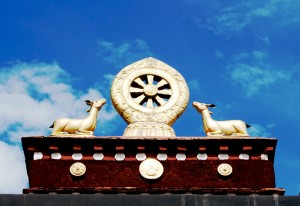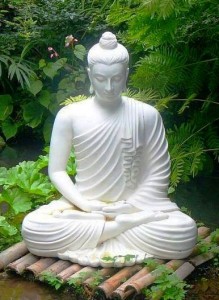Sambuddhathva Jayanthi―May 2011
Posted on May 14th, 2011
Article 7
Buddhist Traditions:
Buddhism has survived successfully for the past 2,600 years without any boosts from sources of power or aggression.ƒÆ’-¡ƒ”š‚ The success can primarily be attributed to the essence of the doctrine, the philosophy of Buddha’s teachings.ƒÆ’-¡ƒ”š‚ what the Buddha taught us is scientific and remains timeless.ƒÆ’-¡ƒ”š‚ According to the Buddhist teachings, solutions to our problems lie within ourselves and not from outside.ƒÆ’-¡ƒ”š‚ Hence, most of our problems can be solved if we apply the Buddhist principles and philosophy meaningfully.
The Buddhist tradition has preserved a distinct ethic for leading day-to-day activities. ƒÆ’-¡ƒ”š‚ The five features implied in the Right Livelihood ethics are: 1) respect for the life ofƒÆ’-¡ƒ”š‚ all beings,ƒÆ’-¡ƒ”š‚ ƒÆ’-¡ƒ”š‚ ƒÆ’-¡ƒ”š‚ ƒÆ’-¡ƒ”š‚ 2) respect for the environment and the ecology, 3) respect for the health and moral welfare of humans, 4) commitment to cordial relations with employees, and 5) moderation in the pursuit of profit.
Whether one lives in Sri Lanka, Myanmar, Thailand, or the United States, the Dhamma (the Truth) remains the same.ƒÆ’-¡ƒ”š‚ Even though there are various sects of Buddhism in many countries, the fundamental principles of Buddha’s teachings remain the same.ƒÆ’-¡ƒ”š‚ In 2011, it is appropriate to utilize this unique Sambuddhathva Jayanthi event to instill Buddhist values, especially in the young minds.
Buddha and the Buddhism:
Prince Siddhartha was born into a royal family in Nepal in 563 B.C.; he gave up all luxuries to become a seeker of the Truth.ƒÆ’-¡ƒ”š‚ Having explored the teachings of numerous sages and teachers, and two extremes leading to suffering which prevents one from becoming enlightened, he realized that the Middle-Path is the ideal one to follow. ƒÆ’-¡ƒ”š‚ After attaining Enlightenment, the Buddha began to spread his Dhamma throughout India.ƒÆ’-¡ƒ”š‚ As a great religious leader, eminent philosopher and psychologist, he became the Light of Asia, uniting people across social and geographical barriers in India.
Buddhist teachings illustrate that unwise and unskillful human behavior is due to three root causes: greed (lobha), anger (dosa or dwesha), delusions, and confused thinking (moha). While dwesha and moha leads to disunity and wars, lobha plays a significant part in lay peopleƒÆ’‚¢ƒ¢-¡‚¬ƒ¢-¾‚¢s lives and particularly in ruining friendships and unity.ƒÆ’-¡ƒ”š‚ The Buddha also has highlighted the danger of excessive indulgence in sensual pleasures.ƒÆ’-¡ƒ”š‚ Based on His teachings, the Buddhist laity is expected to reduce their attachment and sense-pleasures while developing mindfulness for greater peace and happiness.
Core Buddhist Principles:
In the modern society, people frequently undergo multiple stresses and psychological problems.ƒÆ’-¡ƒ”š‚ One in three of us go through a major psychological event during our adult life, a number that is expected to double in 20 years time.ƒÆ’-¡ƒ”š‚ Hence, it is imperative to manage the mind to curb excessive distresses and addictions.ƒÆ’-¡ƒ”š‚ Medication is not the optimum answer.ƒÆ’-¡ƒ”š‚ The danger of indulging in sensual pleasures is the further development of attachment to temporary pleasant feelings.ƒÆ’-¡ƒ”š‚ Attachments to such materialistic objects and pleasant feelings arising from sensual pleasures can also be characterized as addiction.ƒÆ’-¡ƒ”š‚ In fact, addiction is an extreme form of sensual indulgence, with the mind dependent on a particular substance(s), visual or physical stimulation.ƒÆ’-¡ƒ”š‚ As with any other addictions, sensual addictions could also lead to loss of mental, emotional, physical, financial and social well-being.ƒÆ’-¡ƒ”š‚ Those who do not follow the Five-Precepts are the most vulnerable to addiction.

ƒÆ’-¡ƒ”š‚ ƒÆ’-¡ƒ”š‚ ƒÆ’-¡ƒ”š‚ ƒÆ’-¡ƒ”š‚ ƒÆ’-¡ƒ”š‚ ƒÆ’-¡ƒ”š‚ ƒÆ’-¡ƒ”š‚ ƒÆ’-¡ƒ”š‚ Dhamma-Chakka-Pavattana-KathaƒÆ’-¡ƒ”š‚ ƒÆ’-¡ƒ”š‚ ƒÆ’-¡ƒ”š‚ ƒÆ’-¡ƒ”š‚ ƒÆ’-¡ƒ”š‚ ƒÆ’-¡ƒ”š‚ ƒÆ’-¡ƒ”š‚ ƒÆ’-¡ƒ”š‚ ƒÆ’-¡ƒ”š‚ ƒÆ’-¡ƒ”š‚ (wheel of universal law)
Most of us are encumbered with cravings that bind us tightly to the ever-turning wheel of life and death, samsara.ƒÆ’-¡ƒ”š‚ Nevertheless, human beings have the capacity to train, develop, and strengthen their minds to a level where craving can no longer rule or control them.ƒÆ’-¡ƒ”š‚ This state of mind would prevent them from acting out in a variety of unskillful ways.
If things around us is anicca (the nature of not having the things the way we like) and are changing hence impermanent, and such does not convey the results the way we desire, it brings us unhappiness, sorrow and suffering. ƒÆ’-¡ƒ”š‚ The realization that desire is one of the key causes of dukkha (suffering) leads to identification of the causes of suffering, and realization of four Noble Truths.ƒÆ’-¡ƒ”š‚ The fourth Noble truth then facilitates us to follow eight-fold Noble Path to eliminate suffering and achieve nibbana.
Most problems in our lives arise due to our lack of understanding of who we are. ƒÆ’-¡ƒ”š‚ Practice of Buddhism helps us to understand ourselves as well as others.ƒÆ’-¡ƒ”š‚ The Buddha sought us to understand His Dhamma and follow the Middle Path to lead a free and happy life.
In addition to being a philosophy, Buddhism is also a system that tolerates opposing views, and promotes the development of wisdom.ƒÆ’-¡ƒ”š‚ The Buddha never wanted his followers to accept his views and words without studying and questioning.ƒÆ’-¡ƒ”š‚ The moral teachings of the Buddha help us to lead a happy and contented day-to-day life.ƒÆ’-¡ƒ”š‚ In contrast to acts of violence, terrorism, discrimination and greed that have engulfed society in recent years, Buddhism has spread the word of peace, love, compassion and non-violence.
Cause and Effect:
Nothing is permanent. ƒÆ’-¡ƒ”š‚ Our well being, environment, the thought processes are all transient and constantly changing, just as anything else we have experienced.ƒÆ’-¡ƒ”š‚ The ƒÆ’‚¢ƒ¢-¡‚¬ƒ…-worldƒÆ’‚¢ƒ¢-¡‚¬ƒ”š‚ is created in our minds.ƒÆ’-¡ƒ”š‚ According to Buddhist teachings, the process of creating our (illusionary) world is an outcome of a ƒÆ’‚¢ƒ¢-¡‚¬ƒ…-cause and effectƒÆ’‚¢ƒ¢-¡‚¬ƒ”š‚ relationship.ƒÆ’-¡ƒ”š‚ The process is centered in the mind, which indeed is very subtle.
Everything that is in existence is a result of a causeƒÆ’‚¢ƒ¢-¡‚¬ƒ¢¢”š¬‚¢effect process.ƒÆ’-¡ƒ”š‚ Without a cause there wonƒÆ’‚¢ƒ¢-¡‚¬ƒ¢-¾‚¢t be an effect.ƒÆ’-¡ƒ”š‚ If there is a cause there will be an effect that corresponds to the preceding causes. ƒÆ’-¡ƒ”š‚ Cause modifies and shapes the effect.ƒÆ’-¡ƒ”š‚ The effects or results of the causes continue to last as long as the cause fuels the existence of the effect.ƒÆ’-¡ƒ”š‚ Once the cause is gone, the effect will also be gone.
The Buddha, with his Enlightenment, discovered this mystery that has baffled many religious leaders.ƒÆ’-¡ƒ”š‚ He was able to identify the reasons for this complex process and explain it to us using a well-structured methodology known as The Dependent Origination (Paticca-samuppada). If one gets attached to cravings and desires, the corresponding appearance will take the shape of the actions driven by that desire (i.e., effect takes the shape of the cause).ƒÆ’-¡ƒ”š‚ Hence, following the BuddhaƒÆ’‚¢ƒ¢-¡‚¬ƒ¢-¾‚¢s teachings and practice of Vipassana meditation will lay the path to elimination of suffering and achieving the Supreme Nibbana.
Future of the Buddhism and Buddhist Philosophy:
Scientists including Albert Einstein have predicted that the Buddhist philosophy would meet the spiritual needs of the people and progress efficiently in the future.ƒÆ’-¡ƒ”š‚ However, some argue that due to forceful and unethical conversions, along with media and other influencesƒÆ’-¡ƒ”š‚ from the West, and enhancing cravings to materialistic goals and desires, people may leave Buddhism and spur its gradual decline.ƒÆ’-¡ƒ”š‚ Perhaps, what is being destroyed in traditionally Buddhist countries is not the Buddhist philosophy, but the popular Buddhist socio-cultural practices.ƒÆ’-¡ƒ”š‚ ƒÆ’-¡ƒ”š‚ In part, this is due to other secular religions reaching the vulnerable masses more effectively, and providing them material and basic human needs somewhat better than Buddhist philanthropists have been able to do during recent years.
The famous science author, late Arthur C. Clark stated that, by 2,050 Buddhism would be the dominant world religion.ƒÆ’-¡ƒ”š‚ The logic behind his prediction is the trend that is seen, especially among the western scholars, intellectuals and young academics to become Buddhists, observant of the Five-Precepts and practitioners of meditation.ƒÆ’-¡ƒ”š‚ One reason for this growing recognition of Buddhism is that many westerners are leaving the present secularism and seeking mental freedom, independence, and sanity.ƒÆ’-¡ƒ”š‚ ƒÆ’-¡ƒ”š‚ Consequently, in 2009, the ƒÆ’‚¢ƒ¢-¡‚¬ƒ…-WorldƒÆ’‚¢ƒ¢-¡‚¬ƒ¢-¾‚¢s Best religionƒÆ’‚¢ƒ¢-¡‚¬ƒ”š‚ award was given to Buddhism by an international organization, although no one came forward to claim it.
Buddhism and the Culture:
Buddhism encourages aƒÆ’-¡ƒ”š‚ tranquil life style, engaged in healthy cultural and ƒÆ’‚¢ƒ¢-¡‚¬ƒ”¹…”spiritualƒÆ’‚¢ƒ¢-¡‚¬ƒ¢-¾‚¢ pursuits.ƒÆ’-¡ƒ”š‚ BuddhaƒÆ’‚¢ƒ¢-¡‚¬ƒ¢-¾‚¢s teachings encourage freedom of choice; encourage inquiry and observation, and development of inner peace. ƒÆ’-¡ƒ”š‚ This path facilitates the development of the mind and engagement in unremitting and relentless work to benefit others.
However, in the world of corporate mentality and globalization trends, such compassionate activities are afforded less time and priority. ƒÆ’-¡ƒ”š‚ We live in an environment with constant bombardment from television and other media, the industry and the entertainment world, where our minds are manipulated to becomeƒÆ’-¡ƒ”š‚ addicted to chasing goods, services, luxuries and other materialistic benefits. ƒÆ’-¡ƒ”š‚ Consequently, rather than saving and being generous, we are encouraged and trapped into spending beyond our capacity.ƒÆ’-¡ƒ”š‚ In thisƒÆ’-¡ƒ”š‚ ƒÆ’‚¢ƒ¢-¡‚¬ƒ…-rat raceƒÆ’‚¢ƒ¢-¡‚¬ƒ”š‚, there is no room for judgment, insight, awakening, caring, or affection. ƒÆ’-¡ƒ”š‚ Although this is not an ideal environment for the nurturing of Buddhist ideals of virtue, onesƒÆ’‚¢ƒ¢-¡‚¬ƒ¢-¾‚¢ adoption of the BuddhaƒÆ’‚¢ƒ¢-¡‚¬ƒ¢-¾‚¢s noble qualities integrity, intelligence, etc., can make oneƒÆ’‚¢ƒ¢-¡‚¬ƒ¢-¾‚¢s life more balanced in the present chaotic environment.
Considering the growing uneasiness, greed, and the never-ending wars that lead to suffering and death, the world seems to need ethical and moral revival.ƒÆ’-¡ƒ”š‚ It has been argued that human ethics cannot be governed only by religious teachings.ƒÆ’-¡ƒ”š‚ With the ever-growing religious and cultural diversity and philosophical advances, people are beginning to search for a meaningful ultimate path to enlightenment under one teaching.ƒÆ’-¡ƒ”š‚ This is another reason why the future generation may opt for a philosophy as opposed to a religion.
2,600th Sambuddhathva Jathanthi, Origin of Buddhism:
According to the chronological record of Southern Buddhism, on the full-moon day of the month of May of this year (2011), the Vesak day, will be celebrated as the 2,600th birthday of Buddhism or BuddhaƒÆ’‚¢ƒ¢-¡‚¬ƒ¢-¾‚¢s Enlightenment.ƒÆ’-¡ƒ”š‚ On this day, 2,600 years ago, He started to disseminate His composition of Dhamma, worldwide.ƒÆ’-¡ƒ”š‚ Consequently, over 600 million followers of Buddhism are celebrating the 2,600th anniversary of their religion and philosophy.ƒÆ’-¡ƒ”š‚ ƒÆ’-¡ƒ”š‚ Sambodhi commemoration provides a great opportunity to advocate social reforms and equality, an essential Buddhist virtue, to the world at large.
This year, most Buddhist countries are celebrating this event to coincide with a major Buddhist religious observance day, the Vesak full-moon Poya Day.ƒÆ’-¡ƒ”š‚ United Nations Organization and many countries have declared and arranged celebrations mostly from the 16th to the 20th of May 2011 to commemorate the Sambuddhathva Jayanthi event; a unique event in the Buddhist calendar.ƒÆ’-¡ƒ”š‚ A variety of additional devotional activities are also being organized worldwide.
This 2,600 buddhathva jayanthi is not as unique as the 2,500 buddha jayanthi.ƒÆ’-¡ƒ”š‚ There were many factors that made the latter one unique; it significantly contributed to the progress of the practice of Buddhism.ƒÆ’-¡ƒ”š‚ Although one cannot expect similar magnitudes of advancements as a result of the current one, the efforts will not be in vain as it can have an impact on some people, especially newcomers to Buddhism with respect to healthy practices.
We should utilize this milestone, Sambuddhathva Jayanthi, to recall the values taught in Buddhism and improve our spiritual lives through the practice of meditation and Dhamma, and following of the Buddhist principles.ƒÆ’-¡ƒ”š‚ While, some devotional activities are appropriate, excessive celebrations become meaningless unless they are combined with the understanding of the BuddhaƒÆ’‚¢ƒ¢-¡‚¬ƒ¢-¾‚¢s qualities and spiritual development.ƒÆ’-¡ƒ”š‚ Such practices would lead to enhancement of our mental capacity and spiritual content.
BuddhaƒÆ’‚¢ƒ¢-¡‚¬ƒ¢-¾‚¢s message:
Buddha spoke about being free from suffering, compulsions that stem from attachments and coercion.ƒÆ’-¡ƒ”š‚ His teachings are geared to overcome likes and dislikes, anger, jealousy, greed, hate, and hunger for power.ƒÆ’-¡ƒ”š‚ His ultimate message is that one can be free from such compulsions and attachments thus breaking the vicious cycle of samsara or revolving suffering.ƒÆ’-¡ƒ”š‚ Ironically, oneƒÆ’‚¢ƒ¢-¡‚¬ƒ¢-¾‚¢s prosperity, educational level, or economic status has nothing to do with the attainment of such freedom.
Together with the Buddhist meditation practices, the practice of the Four Noble Truths and the Eight-Fold Path remain the foundation of Buddhism. With our privileges and the acquired knowledge, we can contribute enormously to the society and to the welfare of others.ƒÆ’-¡ƒ”š‚ Sharing life experiences and educating others while educating ourselves will further widen our wisdom, and the opportunities to develop our minds and self-discipline. Sambuddhathva Jayanthi is an ideal time to revitalize our efforts toward the above goal.
Wish every being in the universe the supreme bliss of true happiness.
Note: ƒÆ’-¡ƒ”š‚ Some of the material, pictures, poems, and stanzas in these writings may have been published previously, including on the Internet (such as http://what-buddha-said.net and Buddha.direct.net) or obtained from various sources and modified with permission.ƒÆ’-¡ƒ”š‚ The author sincerely thanks all contributors of such materials for their generosity. We anticipate that the brief articles on meditation, Buddhism, and Buddhist philosophy that appear in this column will initiate healthy and positive discussions.
My sincere appreciation for Drs. Manjarika Gunaratne, Bandula Jayathilaka and Sunishka Wimalawansa
for their positive input.
May the Noble Triple Gem bless you
Sunil J. Wimalawansa
Professor of Medicine, Endocrinology, Physiology & Integrative Biology






May 14th, 2011 at 10:34 pm
Thank You, What a wonderful article to read this sunday morning
May 14th, 2011 at 10:56 pm
Prof Sunil Wimalawansa says,
Scientists including Albert Einstein have predicted that the Buddhist philosophy would meet the spiritual needs of the people and progress efficiently in the future.
Pundit Ben SIlva says.
A man’s ethical behavior should be based effectually on sympathy, education, and social ties and needs; no religious basis is necessary. Man would indeed be in a poor way if he had to be restrained by fear of punishment and hope of reward after death. (Albert Einstein, “Religion and Science”, New York Times Magazine, 9 November 1930
Prof Sunil Wimalawansa says,
The famous science author, late Arthur C. Clark stated that, by 2,050 Buddhism would be the dominant world religion.
Pundit Ben SIlva says.
The famed science fiction writer, Arthur C. Clarke, who once denigrated religion as “a necessary evil in the childhood of our particular species,”
Who is the Doosra spinner here ? All readers should enquire and be careful not to get out for the illegal Doosra.
May 15th, 2011 at 4:11 am
Sunil,
I must say your article was well written except please try and refrain from mentioning the likes of Albert Einstein and Arthur C. Clark in your future articles. Both these chaps had contributed well only to the scientific domain but to mention their names to support the Buddha Dhamma is actually a disservice. Beside, their controversial reputations, they are not even Buddhist – so much for their convictions!!!
Its not important whether the Buddha Dhamma is the most “dominant world religion” or the number of Buddhist – we are not in the numbers game and am really glad that the “World’s Best religion” award was not claimed by any one – the True Essence of the Buddha Dhamma is still alive.
May 15th, 2011 at 6:27 am
Many thanks to Prof Wimalawansa. Just to read these words of Hope & Peace within for all mankind blows a breath of fresh air into us !
Why things are the way they in this world at present needs some analysis too. The monetary system of this world at present is like a spiders web, enmeshing us all in rampant profiteering & high materialism for a small group of people. In order to survive and be happy, we must strengthen ourselves internally and help each other too at the same time in whatever ways we can, while distancing ourselves from the ills of the present day negative systems.
Most scientists accept/will accept the Buddhist views of life as Buddhism is based on the rational (scientific), and not on any belief system.
May 17th, 2011 at 8:29 pm
Herman,
You are right.
Ben Silva of Lanka web is proposing to destroy the true essence of Buddha Dhamma becasue the true assence is making Hela people weak.